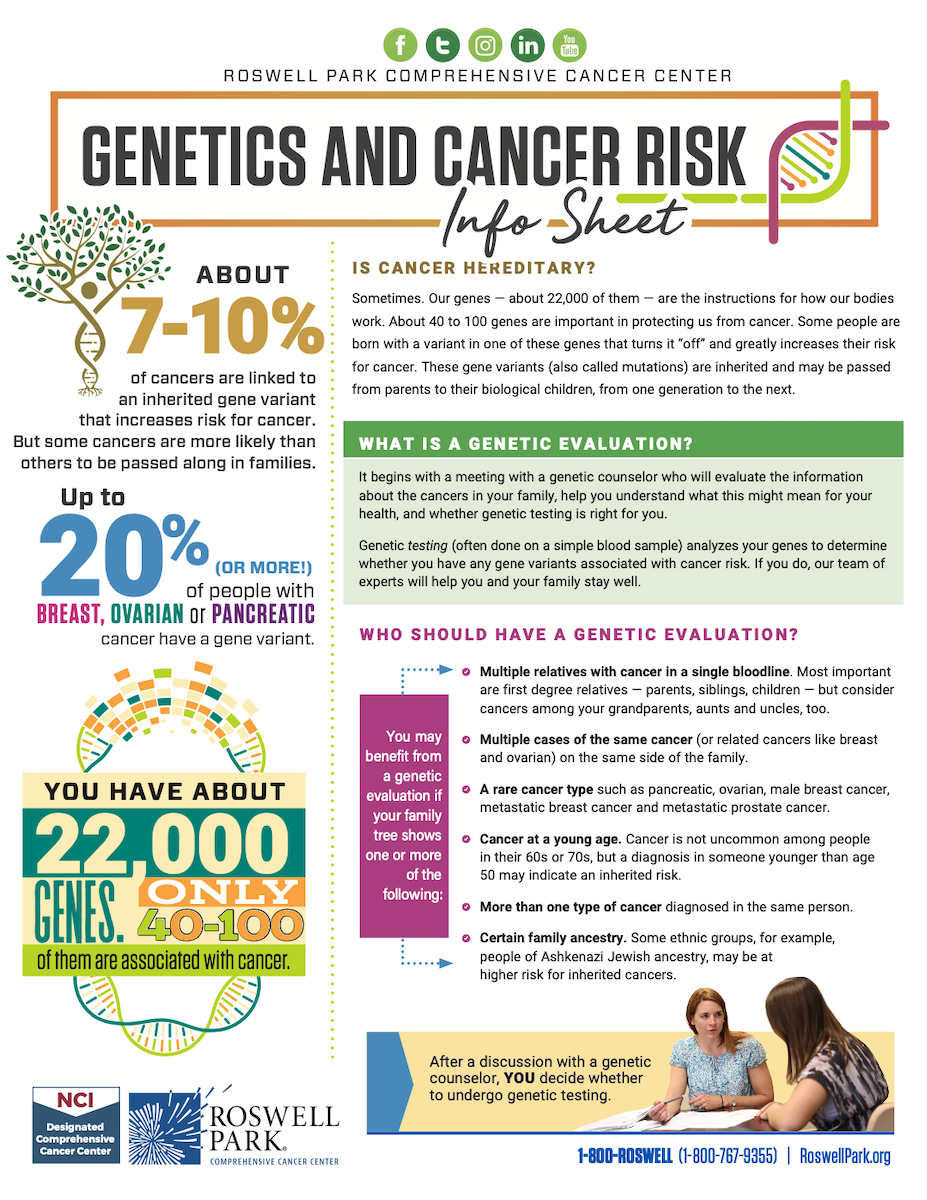Your genome — your entire set of genetic material consisting of about 3 billion pieces of DNA — is the master instruction manual for your body. Every cell in your body contains your entire genome.
If you think of your genome as the whole instruction manual or book, then your genes (segments of DNA) are individual sentences of instruction for how your body functions, which proteins to manufacture, how tall you grow, the color of your eyes, and more.
The human genome contains about 22,000 genes! About 40 to 100 genes are involved in protecting your body from developing cancer. Every now and then a variant (or change or mutation) acts as an “off switch” on one of these 40 to 100 genes, and if that occurs, you may be at increased risk for developing cancer. Because these variants are often inherited, your children, parents, siblings or other family members may also have increased risk for cancer.
Genetic testing looks to see whether you have a variant that turns “off” one of those 40 to 100 genes that defend against cancer.
How common is a genetic variant for cancer?
Overall, about 7 to 10% of people with cancer have a genetic predisposition that made them more susceptible to developing cancer.
However, some cancers are more likely than others to be caused by a genetic predisposition. Up to 20% (or more!) of people with breast, ovarian or pancreas cancer have an inherited gene variant that predisposes them to cancer. Other cancers, such as bladder cancer or hepatocellular carcinoma (a type of liver cancer) are rarely due to a genetic variant.
Known genes are associated with more than 50 hereditary cancer syndromes, and the science is advancing rapidly. If you or a family member is diagnosed with a genetic predisposition to cancer or a hereditary cancer syndrome, cancer is not inevitable. Specialized care — targeted cancer surveillance, precision medical treatment, preventive options — can help you take charge of your health and Roswell Park can guide you every step of the way.
- Hereditary Breast and/or Ovarian Cancer: BRCA1, BRCA2, PALB2, CHEK2, BRIP1, NBN, RAD50, RAD51C, RAD51D, ATM, BARD1
- Von Hippel-Lindau Syndrome: VHL
- Neurofibromatosis: NF1
- Familial Pancreatic Cancer: BRCA2, BRCA1, STK11, CDKN2A, MLH1, MSH2, MSH6, PMS2, EPCAM
- Li-Fraumeni Syndrome: TP53
- Lynch Syndrome or Hereditary Nonpolyposis Colorectal Cancer: MLH1, MSH2, MSH6, PMS2, EPCAM
- Familial Adenomatous Polyposis (FAP) and Attenuated Familial Adenomatous Polyposis: APC, MUTYH
- Paraganglioma and Pheochromocytoma Syndrome: SDHB, SDHD, SDHC, SDHA, SDHAF2, TMEM127, MAX, NF1, FH, RET, VHL
- Cowden Syndrome: PTEN
- Multiple Endocrine Neoplasia Type 2A, 2B and Familial Medullary Thyroid Cancer: RET
- Peutz-Jeghers Syndrome: STK11
- Juvenile Polyposis: BMPR1A, SMAD4
- Hereditary Leiomyomatosis and Renal Cell Cancer (HLRCC): FH
- Birt-Hogge-Dubé Syndrome: FLCN
- Hereditary Melanoma: CDKN2A, CDK4
- DICER1 Syndrome: DICER1
- BAP1 Syndrome: BAP1
Why would I want to know?
It could save your life! Learning whether you have a gene variant that’s associated with cancer is important, because now more than ever before, you can actually do something about it, such as:
- Treat a diagnosed cancer more effectively
- Reduce your risk for a future cancer
- Optimize your health and wellness
- Monitor and screen for earliest cancer detection
- Preserve your fertility
- Decrease the potential for passing the variant on to your children
Using the knowledge of what’s in your genes to proactively prevent cancer and improve wellness is an emerging field known as genetic medicine. Roswell Park is the only cancer center with a department dedicated to cancer prevention and wellness for those at high risk for cancer due to their genetics or family history.
